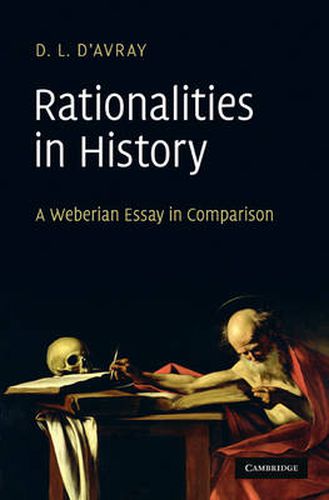Readings Newsletter
Become a Readings Member to make your shopping experience even easier.
Sign in or sign up for free!
You’re not far away from qualifying for FREE standard shipping within Australia
You’ve qualified for FREE standard shipping within Australia
The cart is loading…






In Rationalities in History the distinguished historian David d'Avray writes a new comparative history in the spirit of Max Weber. In a strikingly original reassessment of seminal Weberian ideas, d'Avray applies value rationality to the comparative history of religion and the philosophy of law. Integrating theories of rational choice, anthropological reflections on relativism, and the recent philosophy of rationality with Weber’s conceptual framework, d'Avray seeks to disengage ‘rationalisation’ from its enduring association with Western ‘modernity’. This mode of analysis is contextualised through the examples of Buddhism, Imperial China and sixteenth-century Catholicism - in the latter case building upon unpublished archival research. This ambitious synthesis of social theory and comparative history will engage social scientists and historians from advanced undergraduate level upwards, stimulating interdisciplinary discourse, and making a significant contribution to the methodology of history. D'Avray explores the potential of this new Weberian analysis further in his companion volume, Medieval Religious Rationalities.
$9.00 standard shipping within Australia
FREE standard shipping within Australia for orders over $100.00
Express & International shipping calculated at checkout
In Rationalities in History the distinguished historian David d'Avray writes a new comparative history in the spirit of Max Weber. In a strikingly original reassessment of seminal Weberian ideas, d'Avray applies value rationality to the comparative history of religion and the philosophy of law. Integrating theories of rational choice, anthropological reflections on relativism, and the recent philosophy of rationality with Weber’s conceptual framework, d'Avray seeks to disengage ‘rationalisation’ from its enduring association with Western ‘modernity’. This mode of analysis is contextualised through the examples of Buddhism, Imperial China and sixteenth-century Catholicism - in the latter case building upon unpublished archival research. This ambitious synthesis of social theory and comparative history will engage social scientists and historians from advanced undergraduate level upwards, stimulating interdisciplinary discourse, and making a significant contribution to the methodology of history. D'Avray explores the potential of this new Weberian analysis further in his companion volume, Medieval Religious Rationalities.